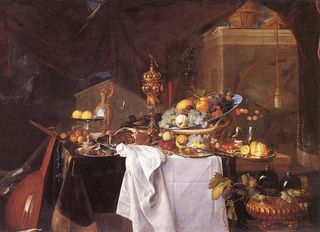Dark Triad
Deceptive Food Calls and the Dark Triad
Women who date men for free meals may be higher in dark triad traits.
Posted March 6, 2020 Reviewed by Hara Estroff Marano
Selfish, deceptive, and exploitative behaviour has been of considerable interest in psychology. A recent study (Collisson et al., 2019) examined a novel form of such behaviour that has been overlooked until now: the foodie call. A foodie call is when someone agrees to go on a date to get a free meal, despite lacking any romantic interest in the person.
The study focused particularly on deceptive foodie calls in women, i.e. when a woman pretends to be romantically interested in a man in the hope that he will pay for her meal. The study found that women who engaged in foodie calls tended to be higher in the dark triad of personality traits than other women.

The dark triad of personality refers to traits related to selfish and antisocial attitudes and behavior, specifically, the traits of psychopathy, Machiavellianism, and narcissism, which indicate callous disregard for the rights of others, a cynical, manipulative approach to social interaction, and a grandiose sense of one’s own superiority to other and feelings of entitlement to special treatment, respectively. On average, men tend to be higher in the dark triad than women (Semenyna & Honey, 2015), and this has led some scholars to consider that the dark triad may represent a particularly masculine social strategy for individuals to extract resources from others, particularly if they lack the skills to get ahead in life by more socially acceptable means.
For example, it has been argued that dark triad traits evolved to facilitate short-term mating in men (Jonason et al., 2009) and that the traits are related to more masculine, less feminine gender roles (Jonason & Davis, 2018). However, others (Carter et al., 2014) have questioned this, pointing out that even though dark traits are less characteristic of women, individual women who are high in these traits may still be able to use them to their own advantage to extract desired resources from others. The use of foodie calls may represent one particular way in which women high in dark traits may take advantage of existing social norms to exploit dating partners.
Collisson et al. examined foodie calls in two studies. Using online surveys, women were asked about whether they had ever engaged in foodie calls, and if so, how often. Additionally, they were asked how acceptable they thought it was to date someone “you were not interested in a relationship with because he might pay for your meal.” In both studies, they completed a measure of the dark triad, and in the first study, they also indicated how much they agreed with traditional gender roles.
First of all, it should be emphasized that in both studies, the majority of women stated that they had never engaged in foodie calls and that they did not think it was acceptable to do so. Of those who had engaged in foodie calls, most said they had done so only occasionally or rarely, while between a fifth and a quarter of them had done so regularly. Additionally, women who had engaged in foodie calls thought of the behavior as much more acceptable than those who had not.
In both studies, more frequent engagement in foodie calls and higher ratings of their acceptability were associated with higher levels of all the dark triad traits. Additionally, in the first study, endorsement of traditional gender roles was also associated with greater frequency and higher acceptability of foodie calls, indicating that women who engaged in this behavior and thought it was more acceptable tended to believe more strongly in traditional roles for men and women.
Since the dark triad traits are distinctive yet also overlap with each other, the researchers examined whether foodie calls were more strongly associated with particular traits or more strongly with a composite of all three. In both studies, they found that the composite measure had a stronger statistical relationship with foodie calls.

Previous studies have found that dark triad traits are associated with lying and cheating as a way for selfish people to get what they want from others while giving as little as possible in return. The study on foodie calls is consistent with this, and suggests that, while most women repudiate this kind of behavior, for the minority who are high in dark traits it may serve as a way of gaining access to desired resources, in this case, potentially expensive restaurant meals.
Furthermore, despite claims that the dark triad is particularly associated with masculine gender roles, the study found that foodie calls were associated with endorsing traditional gender roles for both men and women, which in this case may be taken advantage of by women high in dark triad traits to obtain resources from men for little or nothing in return. In this regard, it may be interesting to examine other kinds of exploitative behaviors that may coincide with traditional gender roles, such as feigning romantic interest to obtain expensive gifts.
This might even be applicable to women who willingly enter into "sugar daddy" arrangements with older, wealthy men in which they provide romance in return for financial support. The sugar daddy phenomenon has been examined from an economic perspective (Mixon, 2019), and it would be interesting to look at the psychological aspects both of the women who agree to such arrangements and the men who offer them. It might turn out that both parties to such arrangements may be high in dark traits, as there is likely an element of exploitation on both sides.
References
Carter, G. L., Campbell, A. C., & Muncer, S. (2014). The Dark Triad: Beyond a ‘male’ mating strategy. Personality and Individual Differences, 56, 159–164. https://doi.org/10.1016/j.paid.2013.09.001
Collisson, B., Howell, J. L., & Harig, T. (2019). Foodie Calls: When Women Date Men for a Free Meal (Rather Than a Relationship). Social Psychological and Personality Science, 1948550619856308. https://doi.org/10.1177/1948550619856308
Jonason, P. K., & Davis, M. D. (2018). A gender role view of the Dark Triad traits. Personality and Individual Differences, 125, 102–105. https://doi.org/10.1016/j.paid.2018.01.004
Jonason, P. K., Li, N. P., Webster, G. D., & Schmitt, D. P. (2009). The dark triad: Facilitating a short-term mating strategy in men. European Journal of Personality, 23(1), 5–18. https://doi.org/10.1002/per.698
Mixon, F. G. (2019). Sugar daddy u: Human capital investment and the university-based supply of ‘romantic arrangements.’ Applied Economics, 51(9), 956–971. https://doi.org/10.1080/00036846.2018.1524129
Semenyna, S. W., & Honey, P. L. (2015). Dominance styles mediate sex differences in Dark Triad traits. Personality and Individual Differences, 83, 37–43. https://doi.org/10.1016/j.paid.2015.03.046




